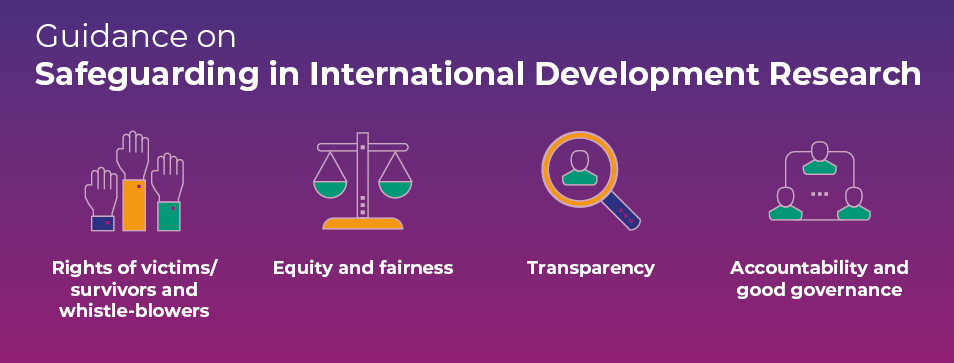Many universities and research institutes have a long history of engagement in research linked to development. However, new funding opportunities (such as the Global Challenges Research Fund and others) have recently encouraged the entry of a range of new actors, bringing some of them into unfamiliar territory regarding safeguarding policy, practice and partnerships in an international context. At the same time, in response to widely publicised cases of sexual abuse, exploitation and harassment (SEAH) in the wider development sector, there has been an urgent focus on – and an evolving understanding of – concepts of vulnerability, risk, harm and power relations that are also relevant to those carrying out or participating in international development research.
UKCDR recognises the strength of good practices across the international development sector, including the valuable work of and progress made by non-governmental organisations (NGOs) and private sector actors in this area. However, the nature of research presents specific situations in which abuses of power may occur and requires a tailored framework and approach. Therefore, it is imperative to draw on the research sector’s wealth of knowledge on ethics and integrity, in order to develop principles and guidance specifically for international development research.
We build upon the Department for International Development (DFID) due diligence guidance that safeguarding is everyone’s responsibility and that specific policies are needed to support research to ‘do no harm’ (DFID, 2018:4). In this guidance, we consider safeguarding as applying to all people involved in and connected to research, and suggest that ‘doing no harm’ requires gaining information about what the potential harms may be, which may not always be immediately apparent. The concept of ‘victim/survivor-centred safeguarding’ is also expanded upon here from its original meaning (Orr et al., 2019) to encompass a model of safeguarding which:
- Responds to and addresses the needs of victims/survivors[1] of harm (through complaints, investigations, actions of redress, care and support)
- Responds to and addresses the needs of research participants who are or have been victims/survivors of crimes or harm (e.g. trafficking/ contemporary forms of enslavement, familial violence, violence through discrimination)
- Appreciates that there is the potential for all people to be victims if harm in research is not prevented or addressed, and this specifically can disproportionately harm minoritized groups (e.g. LGBTQI, women, children, older people, people in subjugated socio-economic groups or castes, Black, indigenous and people of colour, people with disabilities, people living with HIV, refugees and internally displaced people)
- Does not assume that victim/survivor status or geographical location automatically equates to universal vulnerability.
[1] Note on terminology: for consistency, we have adopted the use of ‘victim(s)/survivor(s)’ in this report. We recognise that those potentially or actually affected by harm may use one, both or neither of these terms to refer to themselves, and respect the right of people to decide for themselves how they wish to be identified.

